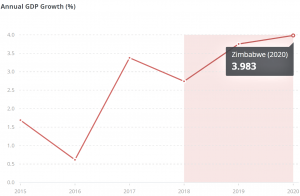Zimbabwe Finance Chief Calls for Crypto Change
Zimbabwe’s recently appointed finance minister has called on the government to take its lead from the Swiss government – and adopt a progressive stance on cryptocurrencies.


Mthuli Ncube was sworn in earlier this month as the Minister of Finance and Economic Development to help the government fight an escalating financial crisis in the country with a population of 16 million people.
Formerly the chief economist and vice president of the African Development Bank, Ncube has been an active player in the Swiss private sector, and appears to believe studying the European nation’s approach to cryptocurrencies could help Zimbabwe turn its economy around.
Zimbabwean media outlet TechZim quotes Ncube as saying, “If you look at the Swiss central bank they are investing in and understanding [cryptocurrencies]. If [Switzerland] can see value in this and where it’s headed, we should also pay attention.”
Ncube also responded to reports that – despite the government’s refusal to legally recognize cryptocurrencies – younger Zimbabweans are increasingly turning to digital tokens as an alternative to the national currency.
Ncube stated, “We have innovative youngsters, so the idea shouldn’t be to stop it and say don’t [trade in cryptocurrencies]. Rather, the regulators should invest in catching up with them and finding ways to understand it.”
Late last month, a group of accountants at anAssociation of Certified Chartered Accountants (ACCA) meeting held in Victoria Falls urged the government to “consider legalizing and regulating the use of cryptocurrencies.” Per media outlet Bulawayo24, the accountants said the move would let Zimbabwe “benefit from tax collections and minimize financial crimes such as money laundering.”
Both Ncube and the ACCA members pointed out the potential benefits of allowing tourism-related companies in the nation to accept cryptocurrency payments. Tourism is one of the African country’s biggest industries and, earlier this year, the Zimbabwe Tourism Authority forecasted a growth rate of 20% for 2018.
In May, the High Court of Zimbabwe reversed the decision of the country’s central bank to restrict cryptocurrency-related operations in the country.
____

Zimbabwe’s year-on-year inflation rate rose to 4,83% in August after gaining 0,54 percentage points from the July rate of 4,29%, the Zimbabwe National Statistics Agency said on Monday.




